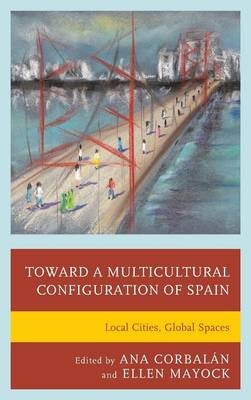
Toward a Multicultural Configuration of Spain
Fairleigh Dickinson University Press (Verlag)
978-1-61147-669-9 (ISBN)
This collection of essays explores cultural phenomena that are shaping global identities in contemporary Spain. This volume is comprised of twenty essays that examine literary, documentary, and film representations of the multicultural configurations of Spain. All of the essays treat multiculturalism in Spain, focusing on reconfigured Spanish cities and neighborhoods through Latin American, African, and/or Eastern European migrations and cultures. Principal themes of the volume include urban space and access to resources, responses to the economic crisis, emerging family portraits, public versus private spaces, the local and the global, marginalities, migrations, and public expression of human and civil rights. This project examines the intercultural exchange that takes place in recent productions against an imaginary homogeneous Spanish national identity. These films, documentaries, and narratives seek to unsettle the Spanish preconceptions of the “Other(s).” Therefore, these texts construct a hybrid concept of the nation in which perceived national identities can be altered by interactions with other cultures from a broader world.
The originality of the work lies in its focus on contemporary Spanish literature, documentaries, and fictional film to foment exploration of how Spanish cities, big and small, are experiencing transformation in architecture, popular customs and festivals, economics, family dynamics, and social and political agency through the arrival of new residents from across the globe. Some of the essays question the very legitimacy of the term ‘multiculturalism,’ others examine the formation of new communities, and still others explore the changes in religious representations and the environmental effects of the tourist industry. Together, the essays offer a compelling portrait of the changing face of contemporary Spain.
Ana Corbalán is associate professor of Spanish at the University of Alabama. Ellen Mayock is Ernest Williams II Professor of Spanish at Washington and Lee University.
Introduction: Spain’s Local Cities and Global Spaces
Ana Corbalán and Ellen Mayock
SECTION I: Literary Representations of the Local and the Global
Chapter 1: Urban Peripheries: Toward a New Vision of a Multicultural Community in Rosa Montero’s Instrucciones para salvar el mundo
Victoria Ketz
Chapter 2: “Una mezcla de amor profundo y asco”: A/Version of Multiculturalism in Lucía Etxebarria’s Cosmofobia
Hayley Rabanal
Chapter 3: The Sum of All: The Image of Madrid in Short Stories by Women Writers
María del Carmen Alfonso García
Chapter 4: City and Community in O club da calceta by María Reimóndez
Pilar Martínez-Quiroga
Chapter 5: Street, City, and Region as Global Contact Zones: Glocalized Self-Identities and Stereotypes in the Graphic Novel El Nord
Raquel Vega-Durán
SECTION II: Migration, Space, and Tourism in Documentary Films
Chapter 6: Immigration and Rhizomatic Itineraries of Resistance in the Global City: Reflections on two films: Si nos dejan and Raval, Raval
Megan Saltzman and Javier Entrambaguas
Chapter 7: Madrid as a glocal enclave in El otro lado: un acercamiento a Lavapiés by Basel Ramsis
Alicia Castillo Villanueva
Chapter 8: Migrating Virgin: Ecuadorian Immigration and the Transformation of Religious and Civic Space in Madrid
Maryanne L. Leone
Chapter 9: Rural Repopulation and the Fabrication of a Global Village in Spain: The Case of Aguaviva
Sohyun Lee
Chapter 10: Another Look at Immigration: La guerra del golf (The Golf War)
Lucía Sánchez
Thomas Deveny
SECTION III: Multicultural Encounters in Local Spaces: Cinematic Depictions
Chapter 11: Spaces Occupied, Literal and Metaphorical, in Contemporary Spanish Fiction and Film: 1997-2011
Donna Gillespie
Chapter 12: The City I Live in: Almodóvar Reshapes Madrid as Spain Goes Glocal
María R. Matz and Carole Salmon
Chapter 13: Geography of Capital: Torremolinos, Modernity and the Art of Consumption in Spanish Film
William Nichols
Chapter 14: Immigration and Spanish Subjectivity in No habrá paz para los malvados
Diana Norton
Chapter 15: When Multicultural Landscape Becomes Tragic Stage: Spanish Film and Immigration on the Verge of the Millennium
Roberto Robles-Valencia
CONTRIBUTORS
| Co-Autor | Alicia Castillo Villanueva, Javier De Entrambasaguas, María del Carmen Alfonso Garcia |
|---|---|
| Verlagsort | Cranbury |
| Sprache | englisch |
| Maße | 161 x 234 mm |
| Gewicht | 485 g |
| Themenwelt | Geisteswissenschaften ► Sprach- / Literaturwissenschaft ► Anglistik / Amerikanistik |
| Geisteswissenschaften ► Sprach- / Literaturwissenschaft ► Literaturwissenschaft | |
| Sozialwissenschaften ► Soziologie ► Spezielle Soziologien | |
| ISBN-10 | 1-61147-669-0 / 1611476690 |
| ISBN-13 | 978-1-61147-669-9 / 9781611476699 |
| Zustand | Neuware |
| Informationen gemäß Produktsicherheitsverordnung (GPSR) | |
| Haben Sie eine Frage zum Produkt? |
aus dem Bereich


